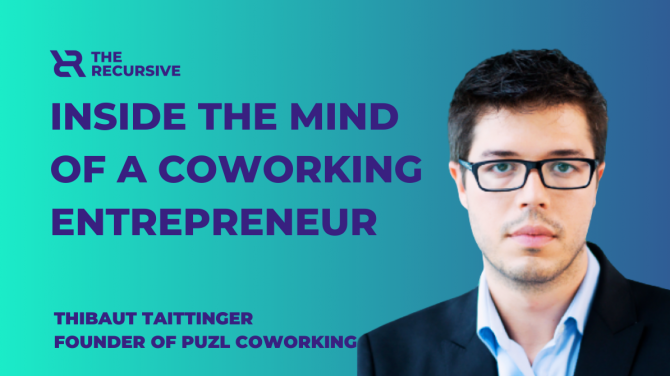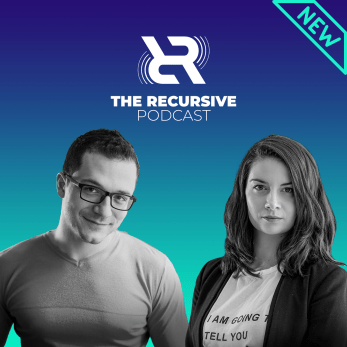Last week, the European Commission officially approved the Bulgarian National Recovery and Resilience Plan, which foresees the allocation of €6.3B in the form of grants toward the sustainable development and recovery of Bulgaria. Out of these around €700M are planned to be invested in innovating the national business environment and infrastructure.
To uncover the impact of the Bulgarian Innovation and Growth Ministry on the local startup ecosystem and investment climate four months after the establishment of the ministry, The Recursive interviewed Daniel Lorer, Minister of Innovation and Growth. Daniel Lorer is a seasoned entrepreneur and investor who is now building a career in politics. At the end of 2021, he was selected to lead the newly-formed Ministry of Innovation and Growth and pave the way for national innovation-driven governance.
Find out what are the ongoing investment projects the government is currently working on, how is innovation covered in the National Recovery and Resilience Plan, and how can SEE governments achieve more cooperation in the fields of innovation.
The Recursive: How is the ongoing crisis with the Ukrainian war and the rising inflation, affecting the investment climate in Bulgaria?
Daniel Lorer: The times are extremely challenging, not only for Bulgaria, but for the entire continent, and the entire world. The challenge is compounded by the complex political situation. We have a setup of operating a government made of four parties and these four parties are quite different in their economic and political overview of how Bulgarian should operate. We have people on the left and on the right of the spectrum. That creates a very vivid discussion within the government about what we should do. The positive side after these first three months is that the government is united in its basic tenet. What we are all after is to make Bulgaria a rule of law place. That is where all the parties in the coalition are in one opinion.
Making Bulgaria a rule of law country turns out to be a long-term task and not something we can accomplish overnight. There are a lot of legacies and a lot of difficulties in the judicial system. This is both the way the prosecution works, the anti-corruption committee which does not find any corruption, and the actual parliamentary government exchange which tends to consume a lot of time but produces little legislative result. This also includes the Supreme Court nominations and the supreme judges committee that dominates all these people.

So far, the signs are quite positive, both in terms of the diplomatic presence and the way foreign countries look at the way Bulgaria acts, advising investors from their countries, whether or not we mean business. So far the feedback has been extremely positive. We have seen an influx of investment in several areas of the economy that Bulgaria wants to emphasize. Whether it’s traditionally ICT, or energy and green transition. Lately we’re starting to see even some Agritech opportunities. We should not relent, we cannot stop the fight. As long as we keep on sending this message and acting along these ways, I’m sure that foreign investments, even Bulgarian investments in the economy of the country will mushroom.
Last year, the caretaker government announced a plant for the production of electric cars near Lovech, and now your government announced a plant for the production of electric batteries near Stara Zagora. Can you share what is the current status of those projects? And is there any new investor interest in building products from Bulgaria?
Well, to throw a few projects around, the electric car project that we inaugurated last year is moving fine. They need their industrial zoning permission so they can start building. They’re hopeful that this will happen towards the end of spring, the beginning of summer. We’ve also recently shown another electric vehicle facility for electric light trucks, most of them exported to the United States.
Another interesting thing that is about to happen in the northeast of Bulgaria is a very large Bulgarian investment in the food industry or processing of certain oils. And that makes me personally very happy because we are traditionally after foreign direct investment. But it shows that there is a sizable capital in Bulgaria that can be reinvested in the country if we can prove that the rule of law applies to everyone.
Then in the ICT segment, we’ve had a number of large Ukrainian operators here, who have now brought a significant part of their workflows from Kyiv and Moscow to Bulgaria.
We’ve seen a number of solar plants being announced in the southwest of the country with various potential manufacturers. So all in all, I can see a lining up of various initiatives. Most optimistically, the figures for January 2022 show that the foreign direct investment has more than doubled compared to January 2021. It’s early to say whether that is a trend or a blip in the statistics, but it’s something that gives us a positive signal. Another aspect of our work, which is equally important, is the preparation of human capital. People who can operate and work in these tech companies can add so much value to the economy.

Probably the best example is the artificial intelligence PhD program between Sofia University and the ETH Polytechnic University of Zurich which is one of the top institutions in this domain. I am convinced that producing top-class AI PhDs in Sofia will inevitably attract top-class AI labs of top-class world companies to locate themselves in Sofia. We are having the same approach with the Agricultural University in Plovdiv. They are going to produce affiliate degrees with Wageningen University, probably the best one in Europe, based in the Netherlands. We are applying the same logic to the Economic University in Varna which plans to open a Tourism University and affiliate this tourism university with one of the top hospitality institutions in Europe. And this concept keeps coming, so you will hear more of it. And a few years down the line, we should be able to have trained talent serving companies based here rather than somewhere else.
The first unicorn in Bulgaria was born just a couple of months ago. How does this success position Bulgaria in the eyes of international investors?

So far we’ve had old economy capital moving here – partially inherited by the state, partially inherited by large corporations, but mostly stuck with 20th-century industries. The exits of the first Bulgarian unicorn will change their balance. The new capital here will bring societal changes because people will request them and then our mission of changing Bulgaria will be accelerated through the force of this capital. That is my biggest bet.
To tell you where it goes, I spoke to my colleague from Estonia, at the latest meeting of ministers. He said that the only metric of his ministry in Estonia is how many unicorns Estonia will produce this year. So I humbly dream of making the notion of unicorns as popular here as it is in Estonia because the Estonians seem to have realized the same things – it’s these young companies that grow so virally fast, that can bring viral changes to their countries in a dramatically positive direction.
Big tech companies like Tesla, Amazon and Microsoft are choosing Greece to develop their R&D sites. Why not Bulgaria? Are we opting for such projects and what value would this bring to our ecosystem?
Greece is a different market, different geopolitical location, and different history. So investors will always look at things in a different way. On the other hand, Greece and Bulgaria are on the way from the Mediterranean to Europe so in some aspects, we are already seeing a very welcoming approach by the Greek government itself to treat Bulgaria and Greece as one unit. So rather than planning our transport separately, we can plan together. Rather than planning energy by ourselves, we can plan energy together. Can we import liquefied gas through the Greek terminal? Is there a pipeline to carry it into Bulgaria? Will they buy capacity in our Atomic Power Station? Can we buy capacity in their ports? All of these things are important to be discussed and the more we discuss the more common topics we discover with the Greeks.
So we are not the same, but we are complementary. I believe investors will understand as well that we have a lot of joint projects between the two countries. But first and foremost, for investors to stick around with us and not only with Greece, we need to convince them that the fundamentals are here – rule of law and decent infrastructure.
Recently you met with your Macedonian counterpart. How can we strengthen regional cooperation in the field of innovation between ministers in SEE? And are there any particular projects that you are working on in collaboration with other ministries?
Truly the North Macedonia situation is the only one where I feel in reverse roles. Traditionally, Bulgaria wants to attract foreign investors. But since we are considerably larger than our western neighbor, North Macedonia, we are the larger investor. It’s a fascinating position to be in and Bulgarian investors are quite present in North Macedonia, whether it’s in financial services, IT, or energy because they are adopting an energy transformation program, very similar to ours. And I think that will continue to flow in this direction.
The role of governments is first of all to remove obstacles. We need to remove the political “stone-throwing” at each other. You can have a constructive dialogue around economic topics, removing obstacles, allowing transportation, and allowing and supporting mutual investments, which then allows for much smoother political dialogue. For example, we agreed with Deputy Prime Minister Fatmir Bytyqi who is in charge of economic portfolio, to have a common mechanism for logging complaints of North Macedonian companies investing in Bulgaria, and Bulgarian companies investing in North Macedonia, for economic discrimination based on place of origin. That’s an example of policies helping the development of the relations between the two countries.
Nowadays, in the context of the Russian aggression against Ukraine, the questions about the lifting of the veto, and the beginning of the negotiation, between North Macedonia and the European Union have become vital, because the conflict in Ukraine has shown one thing: there’s no neutrality. If you are not in the EU or NATO, you’re up for the taking. So now the question is, what is the right formula that will allow Bulgaria to lift the veto, and welcome North Macedonia into the negotiating process?
How is innovation covered in the updated version of the National Recovery and Resilience plan? Can you maybe mention some projects that are included?
The innovation fields where we will put most emphasis are green transition, energy, digitalization of government services, and companies infrastructure. There will be a certain focus on cybersecurity, for obvious reasons, and we will aim to help companies improve their cybersecurity and technological infrastructure. This summer, we are also going to revive the National Innovation Fund, which sponsors Bulgarian companies to acquire research services from academic institutions so they can improve the intellectual property of their products. And later on, we would also sponsor academic institutions to create spin-offs. I dare say we also have a small dream about the first Bulgarian space program.
Do you plan to initiate any amendments to improve the framework for the development of innovative businesses in Bulgaria?
Again, a note on North Macedonia – they are actually catching up with their ease of doing business index, and we should do radical things here because it is a race and we are being constantly compared to other countries. In order to do that, probably the biggest problem area will be creating digital services. Our administration has been notoriously paper-based for some time now. One of the largest chunks in the state budget, and in the European operating programs, is intended to be spent on making government services digital. Portals, paperless internal checks, all of this has to be digital so that it becomes a lot faster and a lot easier to track and control. And that is what we are after.





